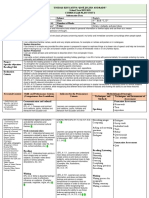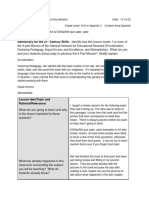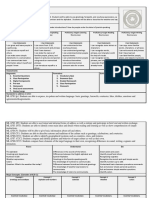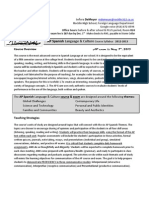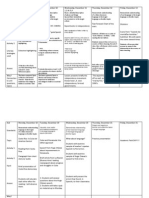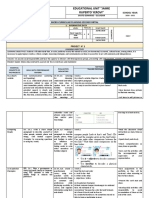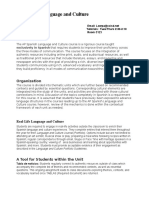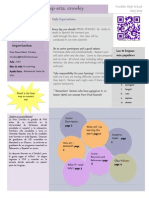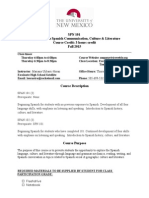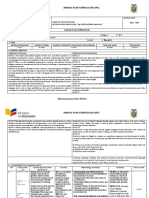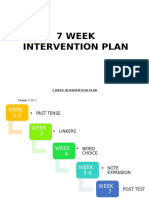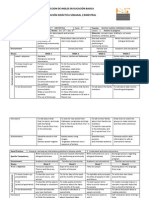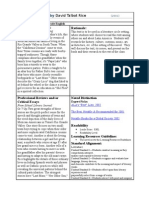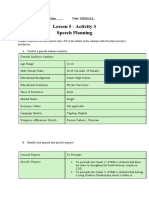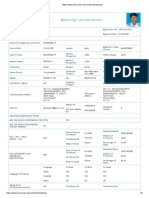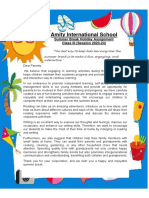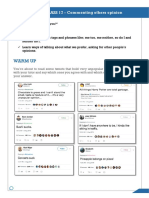Spanish 2 Curriculum Map
Uploaded by
jnnewman.coSpanish 2 Curriculum Map
Uploaded by
jnnewman.coThe Academy Curriculum Mapping - Newman
Content Area: Spanish
Course Name: Spanish 2
Grade Level(s): 9-12
Last Modified: 6/11/21
Month Unit Standards Knowledge & Skills Vocabulary
(Power Standards in Bold)
August- Special Students will be able to use basic greetings, (buenos días, buenas tardes, buenas
introductions and leave-takings. ● I can participate in conversations on a number noches, mucho gusto, encantado, nos
September person
of familiar topics using simple sentences. vemos, hasta luego)
interviews (10 NHIC1 I can exchange some personal information
classes) ● I can handle short social interactions in Numbers, Alphabet, School supplies,
NHIL1 I can sometimes understand simple everyday situations by asking and answering basic weather expressions, dates
Bex 14 El questions or statements on familiar topics. simple questions.
Niño ¿Cómo fue tu verano?
● I can present information on most familiar ¿Qué hiciste?
Desobediente topics using a series of simple sentences. ¿Qué te gusta hacer?
mini unit ¿Tienes un talento interesante?
● I can write briefly about most familiar topics ¿Tienes animales?
(4 class days)
and present information using a series of ¿Juegas a un deporte?
simple sentences.
hace/hizo, debe/debía,
● I can understand the main idea of short and
escucha/escuchó
simple texts when the topic is familiar.
● I can understand the main idea in short,
simple messages and presentations on familiar
topics.
● I can understand the main idea of simple
conversations that I overhear
Essential Question:
How do I use Spanish to talk about my life now?
How do I use Spanish to talk about something that happened in the past?
How can I be more open to other cultures through the study of the Hispanic cultures?
What should parents do for their kids? What should kids do for their parents?
Assessments:
Reading: Students read typed story from the interview Speaking: retell about each person
Listening: up/down listening quiz (informal) Writing: Free write quiz about each student & Free write: What should parents do/not do for their kids?
Example Activities, Engagement Strategies, Resources, and Project
Circle up and ask personalized questions, change partners with ‘¡jalen!’ ‘si eres un muchacho, cambia’ ‘si tu cumpleaños está en octubre, cambia) handgames
(5-5-10, cho-co-la-te, Número Mágico) Hatchi Patchi, SSR, talk then read, talk then write, airplane reading, Read Persona Especial information, SSR
Student Outcomes (Unit & Lesson Objectives):
NLIC1.1 I can say hello and goodbye. I can ask and talk about friends, classmates, teachers, or co-workers.
I can sometimes understand questions about how old I am, where I live, what I do in my free-time, etc.
I can sometimes understand questions or statements about my friends and classmates or workmates.
NHPW1.1 I can introduce myself.
NHPW1.2 I can describe my family and friends.
NHPW1.3 I can describe my school.
NHIL1.1 I can recognize the difference between a question and a statement.
NHIL1.2 I can sometimes understand questions about how old I am, where I live, what I do in my free-time, etc.
NHIL2.1 I can understand some facts about the weather when weather symbols are used.
NHIL2.3 I can follow along with simple arithmetic problems when I can see the figures.
I can talk about my likes and dislikes using gustar
ILPW2.1 I can write out a draft of a presentation that I plan to present orally.
ILIL3.2 I can understand questions about my likes and dislikes.
NHPS4.1 I can talk about others’ likes and dislikes using gustar
NHPS4.2 I can talk about others’ free-time activities.
NHPS4.3 I can give basic biographical information about others.
Month Unit Standards Knowledge & Skills Vocabulary
(Power Standards in Bold)
October La Leyenda Students can distinguish between ser llora, va a, quieren comer, se muere, se va
● I can participate in conversations on
de La Llorona and estar.
Students can identify famous latinos. a number of familiar topics using no puede/pudo encontrar, una mujer vieja,
(5-6 days)
simple sentences. sus hijos
● I can handle short social interactions
Bex 15 Las in everyday situations by asking and
Madres de la answering simple questions.
Plaza de ● I can present information on most
Mayo (3 familiar topics using a series of
days) simple sentences.
● I can write briefly about most
familiar topics and present
information using a series of simple
sentences.
● I can understand the main idea of
short and simple texts when the
topic is familiar.
● I can understand the main idea in
short, simple messages and
presentations on familiar topics.
● I can understand the main idea of
simple conversations that I
overhear.
Essential Questions:
1. What were the Madres de la Plaza de Mayo fighting for?
2. What do the Madres have in common with La Llorona?
3. How does the Dirty War apply to anything going on in the world today?
Assessments:
Reading: La Llorona quiz Speaking: retell La Llorona
Listening: post-story quiz Writing: Free write retelling La Llorona & ACE: What is the biggest difference between La Llorona and the Madres?
Example Activities, Engagement Strategies, Resources, and Project
Embedded La Llorona reading, dramatize reading, Fan N Pick reading
Personalized Questions, Storyasking, Circling
Student Outcomes (Unit & Lesson Objectives):
Month Unit Standards Knowledge & Skills Vocabulary
(Power Standards in Bold)
November Unit 4: Bex Students can use phrases necessary vive/vivía solo, trabaja/trabajaba,
● I can participate in conversations on
16 El Gaucho to buy tickets, use public necesita/necesitaba/necesitó
transportation. a number of familiar topics using
Argentino (5
simple sentences. llega allí, lleva, regresa
days)
Students can ask and give directions ● I can handle short social interactions
or locations using commands and
prepositional phrases. in everyday situations by asking and
answering simple questions.
Bex 17 El
Students can conjugate and narrate ● I can present information on most
Viajero (6 past actions using the preterite. familiar topics using a series of
days)
simple sentences.
● I can write briefly about most
familiar topics and present
information using a series of simple
sentences.
● I can understand the main idea of
short and simple texts when the
topic is familiar.
● I can understand the main idea in
short, simple messages and
presentations on familiar topics.
● I can understand the main idea of
simple conversations that I
overhear.
Essential Questions:
1. Do you prefer to live alone or with others and why?
2. Are you a traveller or a tourist?
3. What are 2 major cultural elements that shape Argentina? What is the biggest difference between Mexico and Argentina?
4. «¿Qué peligros posibles hay al cruzar la frontera entre México y Los Estados Unidos?
Assessments:
Reading: El Gaucho & La inmigración Speaking: retell Mama’s Boy
Listening: post-story quiz & listening assessment using illustrations Writing: Free-Write
Example Activities, Engagement Strategies, Resources, and Project:
Blind Retell, Storyasking, Before and After, MovieTalk “El Gaucho Goofy,” I’m Going on a Trip game, Running Dictation, Coyote Song Conor Oberst, Peligro
en el Desierto listening activity, Team Windows
Student Outcomes (Unit & Lesson Objectives):
Month Unit Standards Knowledge & Skills Vocabulary
(Power Standards in Bold)
December Bex 18 Las Students can complete a transaction for parece raro, le da, devuelve
● I can participate in conversations on a
supersticione good and services.
number of familiar topics using simple viene a un pueblo, toda la gente lee,
s (3 days)
sentences. pone (libros) encima de
Bex 19 El ● I can handle short social interactions in
Biblioburro everyday situations by asking and school supplies, pastimes
(3 days) answering simple questions.
● I can present information on most
familiar topics using a series of simple
sentences.
● I can write briefly about most familiar
topics and present information using a
series of simple sentences.
● I can understand the main idea of short
and simple texts when the topic is
familiar.
● I can understand the main idea in short,
simple messages and presentations on
familiar topics.
● I can understand the main idea of
simple conversations that I overhear.
Essential Questions:
1. What is the purpose of superstitions? Do you have superstitions? What can superstitions tell us about a culture?
2. What is the purpose of reading? How can literacy change someone? ¿Es importante tener acceso a una biblioteca?
3.
Assessments:
Reading: Ladrones Habituales Speaking: retell Mama’s Boy
Listening: Dictation Writing: Supersticiones Writing Assessment / Focused Free Write
Example Activities, Engagement Strategies, Resources, and Project
Story strips, write-draw-pass, Two Truths and a Lie, Fake Biographies,
Student Outcomes (Unit & Lesson Objectives):
Month Unit Standards Knowledge & Skills Vocabulary
(Power Standards in Bold)
January Bex 20 Students can write about an image in deja, la misma tienda, lleva una camisa
● I can participate in conversations on
Ladrones (4-5 6-9 sentences using a variety of verbs.
a number of familiar topics using durante la noche, oye algo, se despierta,
days)
simple sentences. se duerme
Bex 21 Una Students can describe their daily ● I can handle short social interactions
routine using reflexives and time. Reflexive Verbs
Aventura de in everyday situations by asking and
Camping (3 answering simple questions.
Environment, Outdoors
days) ● I can present information on most
familiar topics using a series of
simple sentences.
● I can write briefly about most
familiar topics and present
information using a series of simple
sentences.
● I can understand the main idea of
short and simple texts when the
topic is familiar.
● I can understand the main idea in
short, simple messages and
presentations on familiar topics.
● I can understand the main idea of
simple conversations that I
overhear.
Essential Questions:
1.
Assessments:
Reading: Ladrones Habituales Speaking: retell Mama’s Boy
Listening: Post-story Quiz Writing: Focused Free Write
Example Activities, Engagement Strategies, Resources, and Project
Mentiroso, Crime infographics, Human Timeline, Emotions Analysis, Class Storybook, Cooperative Mural
Student Outcomes (Unit & Lesson Objectives):
Month Unit Standards Knowledge & Skills Vocabulary
(Power Standards in Bold)
January Bex 22 Los
● I can participate in conversations on
teme, construye con cuidado. toca, feroz,
tres cerditos déjame, termina, sopla
a number of familiar topics using
(3 days)
simple sentences. el joven quiere ir, se queda, sigue
Bex 23 La ● I can handle short social interactions
mamá in everyday situations by asking and
vigilante (3 answering simple questions.
days) ● I can present information on most
familiar topics using a series of
simple sentences.
● I can write briefly about most
familiar topics and present
information using a series of simple
sentences.
● I can understand the main idea of
short and simple texts when the
topic is familiar.
● I can understand the main idea in
short, simple messages and
presentations on familiar topics.
● I can understand the main idea of
simple conversations that I
overhear.
Essential Questions:
Assessments:
Example Activities, Engagement Strategies, Resources, and Project
Student Outcomes (Unit & Lesson Objectives):
Month Unit Standards Knowledge & Skills Vocabulary
(Power Standards in Bold)
February Bex 24 Saca
● I can participate in conversations on
no entiende nada, sonríe, saca un boleto
el boleto
a number of familiar topics using la ropa, cuesta demasiado, compra, vende,
Bex 25 simple sentences. clothing vocab
Cuesta ● I can handle short social interactions
demasiado in everyday situations by asking and hay que (estudiar), poco a poco, vuelve a,
answering simple questions. se aburre
Bex 27 La
● I can present information on most
Siesta
familiar topics using a series of
simple sentences.
● I can write briefly about most
familiar topics and present
information using a series of simple
sentences.
● I can understand the main idea of
short and simple texts when the
topic is familiar.
● I can understand the main idea in
short, simple messages and
presentations on familiar topics.
● I can understand the main idea of
simple conversations that I
overhear.
Essential Questions:
Assessments:
Example Activities, Engagement Strategies, Resources, and Project
Student Outcomes (Unit & Lesson Objectives):
Month Unit Standards Knowledge & Skills Vocabulary
(Power Standards in Bold)
March Bex 2.2 La
● I can participate in conversations on
se acercó, vio que había, se la/lo llevó
muchacha y
a number of familiar topics using volvió temprano, conoció a un joven, se
la ardilla
simple sentences. divirtieron
Bex 2.3 La ● I can handle short social interactions
Madre de in everyday situations by asking and cayó al suelo, leyeron en el periódico, oyó
Jasón answering simple questions. un ruido
● I can present information on most
Bex 2.4
familiar topics using a series of
Gringo
simple sentences.
Reading
Mini-Unit ● I can write briefly about most
familiar topics and present
information using a series of simple
sentences.
● I can understand the main idea of
short and simple texts when the
topic is familiar.
● I can understand the main idea in
short, simple messages and
presentations on familiar topics.
● I can understand the main idea of
simple conversations that I
overhear.
Essential Questions:
Assessments:
Example Activities, Engagement Strategies, Resources, and Project
Student Outcomes (Unit & Lesson Objectives):
Month Unit Standards
(Power Standards in Bold)
April Bex 2.5 Ruidos en la noche Students can conjugate the imperfect.
Bex 2.6 El Secreto
Bex 2.7 El Acosador
Essential Questions: Essenti
Assessments:
Example Activities, Engagement Strategies, Resources, and Project
Student Outcomes (Unit & Lesson Objectives):
Month Unit Standards Knowledge & Skills Vocabulary
(Power Standards in Bold)
April Novel: El ● I can participate in conversations on
Nuevo a number of familiar topics using
Houdini simple sentences.
● I can handle short social interactions
in everyday situations by asking and
answering simple questions.
● I can present information on most
familiar topics using a series of
simple sentences.
● I can write briefly about most
familiar topics and present
information using a series of simple
sentences.
● I can understand the main idea of
short and simple texts when the
topic is familiar.
● I can understand the main idea in
short, simple messages and
presentations on familiar topics.
● I can understand the main idea of
simple conversations that I
overhear.
Essential Questions:
Assessments:
Example Activities, Engagement Strategies, Resources, and Project
Student Outcomes (Unit & Lesson Objectives):
Month Unit Standards Knowledge & Skills Vocabulary
(Power Standards in Bold)
May Bex 2.8 El
● I can participate in conversations on
se siente, se puso triste, empezó,
hombre feliz consiguió
a number of familiar topics using
– Short Film
simple sentences. se enojó, se rió, ganó, perdió
Unit
● I can handle short social interactions
Bex 2.11 El in everyday situations by asking and
que se enoja, answering simple questions.
pierde ● I can present information on most
familiar topics using a series of
simple sentences.
● I can write briefly about most
familiar topics and present
information using a series of simple
sentences.
● I can understand the main idea of
short and simple texts when the
topic is familiar.
● I can understand the main idea in
short, simple messages and
presentations on familiar topics.
● I can understand the main idea of
simple conversations that I
overhear.
Essential Questions:
Assessments:
Example Activities, Engagement Strategies, Resources, and Project
Student Outcomes (Unit & Lesson Objectives):
You might also like
- Educ450 Bergman Center of Educator Preparation Cep Lesson Plan 2No ratings yetEduc450 Bergman Center of Educator Preparation Cep Lesson Plan 218 pages
- 2013 AP Spanish Language Syllabus 322302v1AMYNo ratings yet2013 AP Spanish Language Syllabus 322302v1AMY10 pages
- 5-12 Spanish Instructional Alignment: June 2nd, 2016No ratings yet5-12 Spanish Instructional Alignment: June 2nd, 201611 pages
- AP Spanish Language and Culture SyllabusNo ratings yetAP Spanish Language and Culture Syllabus19 pages
- Unidad Educativa "San Lorenzo": Annual Curriculum PlanNo ratings yetUnidad Educativa "San Lorenzo": Annual Curriculum Plan9 pages
- Unidad Educativa "Otto Arosemena Gómez": English A1. 2No ratings yetUnidad Educativa "Otto Arosemena Gómez": English A1. 23 pages
- Listening and Speaking Activities For 3Rd Grade StudentsNo ratings yetListening and Speaking Activities For 3Rd Grade Students18 pages
- New Learning 5 Egb - Year and Unit PlansNo ratings yetNew Learning 5 Egb - Year and Unit Plans81 pages
- Unidad Educativa "Otto Arosemena Gómez": EmailNo ratings yetUnidad Educativa "Otto Arosemena Gómez": Email3 pages
- Spanish Basics: Names, Ages, & ClassroomNo ratings yetSpanish Basics: Names, Ages, & Classroom7 pages
- Annual Curriculum Plan Unidad Educativa Blanca Cuadros de Zambrano School Year 2016-2017No ratings yetAnnual Curriculum Plan Unidad Educativa Blanca Cuadros de Zambrano School Year 2016-201710 pages
- How The World Works How We Express Ourselves Who We Are Where We Are in Place & Time Sharing The Planet How We Organize OurselvesNo ratings yetHow The World Works How We Express Ourselves Who We Are Where We Are in Place & Time Sharing The Planet How We Organize Ourselves9 pages
- Techno-Commercial Sales Executive (JR.) of Raw Materials (Pharmaceutical, Home & Personal Care)No ratings yetTechno-Commercial Sales Executive (JR.) of Raw Materials (Pharmaceutical, Home & Personal Care)2 pages
- Ls1 English Communication Junior High SchoolNo ratings yetLs1 English Communication Junior High School74 pages
- Lesson 01 - Reading Practice - Open ClozeNo ratings yetLesson 01 - Reading Practice - Open Cloze5 pages
- Class 3 - Summer Holiday Homework 2023-24No ratings yetClass 3 - Summer Holiday Homework 2023-2420 pages
- Write A Paragraph About The Animals That You Know and The Sounds They MakeNo ratings yetWrite A Paragraph About The Animals That You Know and The Sounds They Make9 pages
- b2 First For Schools Class Lesson Plans EnvironmentNo ratings yetb2 First For Schools Class Lesson Plans Environment12 pages
- Intermediate English: Question Tags & PreferencesNo ratings yetIntermediate English: Question Tags & Preferences9 pages
- The Input Hypothesis Issues and Implications - KrashenNo ratings yetThe Input Hypothesis Issues and Implications - Krashen17 pages
- (Ebook) Writing History: A Guide For Canadian Students by William Storey Towser Jones ISBN 9780195440126, 0195440129 Instant DownloadNo ratings yet(Ebook) Writing History: A Guide For Canadian Students by William Storey Towser Jones ISBN 9780195440126, 0195440129 Instant Download58 pages
- Unit 4 - Look After Yourself - Should - Shouldn't and ContrastNo ratings yetUnit 4 - Look After Yourself - Should - Shouldn't and Contrast9 pages


